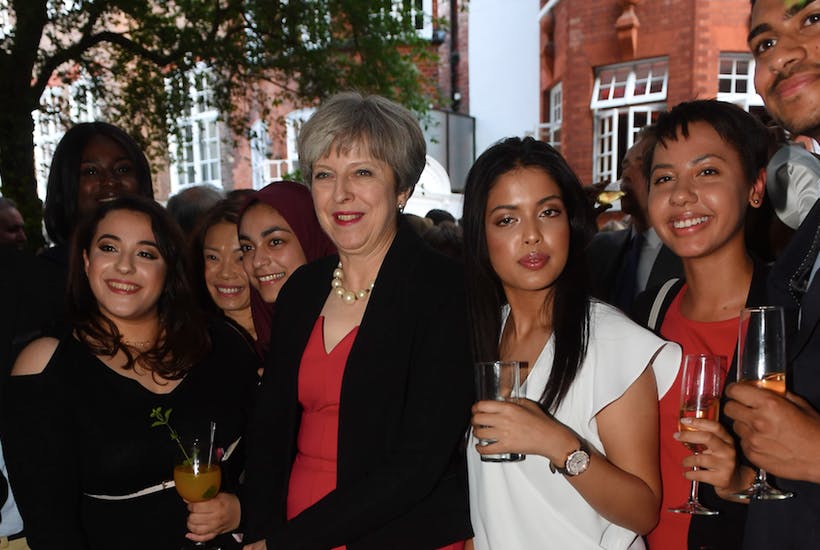Perhaps the most insightful piece of political analysis since the turn of the century came from the Queen in a speech to the United Nations a few years ago. She first addressed the UN in 1957 and returned in 2010 to reflect on what she had learned in the interim. She had seen prime ministers every week and dined with presidents from all over the world — but what struck her was how seldom their schemes translated into real progress. ‘Many sweeping advances have come about not because of governments, committee resolutions, or central directives,’ she pointed out, ‘but instead because millions of people around the world have wanted them.’
Politicians run the government, not the country. That’s a consoling thought at a time when the Conservative government looks almost as bad as the party that would replace it. The election humiliation was followed by deeply unedifying negotiations with the European Union, giving a sense of perpetual chaos. Still, for all the crises in Westminster this year, the country has never been wealthier, or healthier, or more full of jobs. The political soap opera has been dire at times, but this has emphatically not been a year of disaster.
Even when government is fully functioning, the solutions to many problems lie beyond its powers. Take, for example, social mobility. MPs often point out that those growing up in poverty have far worse life chances but, other than school reform, they tend to offer few solutions.
That’s why, this year, The Spectator is not asking its readers to offer money to a charity, as newspapers often do. We propose something that could be even more useful: to find work experience placements for teenagers on the books of the Social Mobility Foundation.
Talented pupils do well at school, but they often lack the connections to get into the world of work. Internships, so often the route to the best jobs, are usually offered on an informal basis. They cost nothing to employers, yet they are invaluable to young people. To spend even a couple of weeks as an intern gives a pupil the chance to fall in (or out of) love with a profession. It demystifies work for those who have assumed that people in top jobs are somehow different.
How to open up this process to those without the connections? Not every employer has the time or budget to run an outreach scheme. But the SMF offers any interested employer a dazzling list of straight-A students from disadvantaged backgrounds from all over Britain.
So our appeal, this year, is for our readers to use what connections they might have to find companies (or just someone in a company) willing to let a teenager work with them for a week or two. All we ask is that you email us with any offers at the address below. The SMF will be in touch, and provide the interns. The process is easy. The hard part for employers might be letting the interns go: over the years, The Spectator has hired three SMF alumni.
At our carol concert this year, the rector of St Bride’s recalled how she had recently visited the Anglican cathedral in Malta and was struck to find a memorial to the Maltese war effort, paid for by Spectator readers. It is one of many causes that our readers have taken up over the years. On the editor’s desk, for example, is a silver statuette of a miner given by the Welsh town of Aberdare in 1929 to thank The Spectator for ‘adopting’ and sustaining its people during the Great Depression. Today, a large welfare state redistributes money — but redistributing opportunity is harder.
Last year, a simple mention of the SMF in the magazine led to a huge response from our readers offering work placements. This year, by making this our Christmas appeal, we hope to find even more.
We know The Spectator’s readers are generous. We also know they are exactly the sort of people who would be willing to pull strings for someone they don’t know. Our Christmas appeal here seeks to give them the opportunity to do just that.
It is a very British habit to despair of the young. But Britain’s upcoming generation offers plenty to be enthusiastic about. Their behaviour, in many ways, is better than that of their parents. As a country we are producing civic–minded and brilliantly educated young people. And this, rather than the ongoing political tragicomedy, offers the best reason to be confident about our future.
Got something to add? Join the discussion and comment below.
Get 10 issues for just $10
Subscribe to The Spectator Australia today for the next 10 magazine issues, plus full online access, for just $10.
You might disagree with half of it, but you’ll enjoy reading all of it. Try your first month for free, then just $2 a week for the remainder of your first year.














Comments
Don't miss out
Join the conversation with other Spectator Australia readers. Subscribe to leave a comment.
SUBSCRIBEAlready a subscriber? Log in